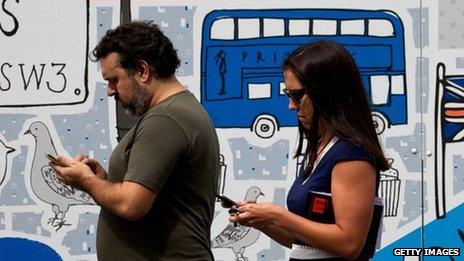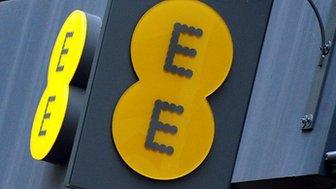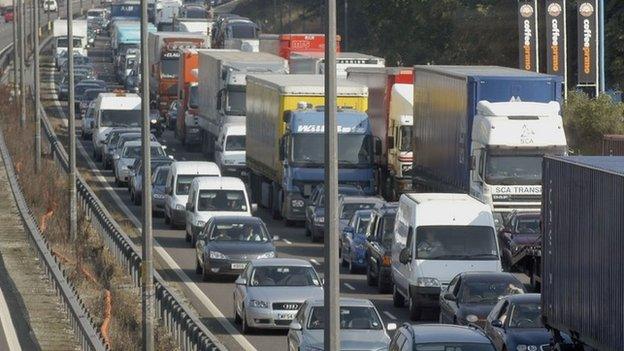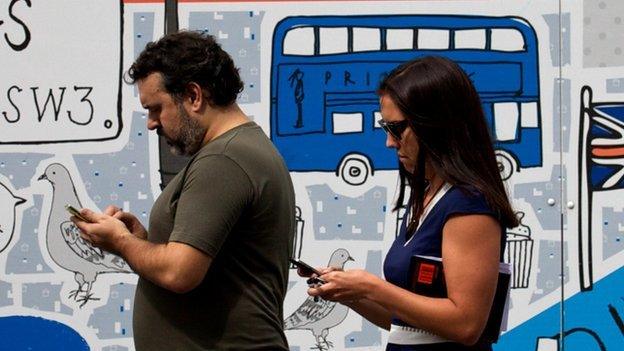EE first and Vodafone last in mobile phone tests
- Published

The UK's four mobile networks have all seen improvements in recent months, research suggests
EE has again been ranked top overall in research comparing the performance of the UK's four mobile networks, with Vodafone coming last.
Research firm RootMetrics tested UK networks for the speed and reliability of their voice, data and text services in the first half of 2014.
EE was ranked first overall, followed by Three, O2 and finally Vodafone.
But RootMetrics said all networks showed signs of improvement compared with last year.
RootMetrics' research is based on more than 920,000 tests of the networks' services, conducted across the UK in the first six months of the year.
It rated the performance of each operator out of 100 in a range of categories - overall performance, call performance, mobile internet, text, network reliability and network speed.
It said mobile internet performance is "currently a two-horse race" with EE and Three scoring 85.5 and 82.7 respectively, putting them well ahead of O2 (68.1) and Vodafone (67.0).
'Massive investment'
EE came out best in terms of calls and texts, but RootMetrics said all four networks showed strong results in both these categories.

EE has benefitted from its early rollout of 4G
EE outshone its rivals in terms of network speed, but was matched by Three on reliability.
"Today's results, along with last week's report from Ofcom, show that EE is providing the best mobile experience to businesses and consumers across the UK," said Olaf Swantee, EE's chief executive.
"We continue to invest in getting even better, and setting new standards for performance and reliability."
In a statement a spokeswoman for Vodafone said the company was spending £1bn this year alone on improving mobile coverage and network quality.
'Gap narrowing'
"Regular independent testing of our network shows that our customers are experiencing a significantly improving network every day due to our massive ongoing investment," she said.
Last week research from Ofcom showed EE had the best services across the UK, while Vodafone has the worst quality of calls for mobile phone customers in rural areas.
But Matthew Howett, an analyst with research firm Ovum, said EE had benefited from a significant head-start in the rollout of 4G, and RootMetrics' research suggested its rivals were catching up.
"It seems as though the gap is narrowing in terms of the main operators in the UK," he told the BBC.
"All of the networks will be in a fairly similar position this time next year, because they will be deploying 4G more widely. There will be better coverage of data, particularly in the rural areas, and things look to be getting better for Vodafone."
An O2 spokesperson said: "This report represents just one of the many testing houses operating in the marketplace. Our own extensive independent network tests, carried out by Spirent Communications between May and July this year, show O2 as number one in 17 out of the 20 key cities tested for voice-call performance and top in 12 out of 20 for data performance.
"As we continue to roll out our 4G service an modernise our 2G and 3G networks at the same time, the results from the Spirent survey demonstrate that our investment of £1.5bn over the next three years will help us to deliver faster speeds and greater coverage across the UK, ensuring our customers continue to have a great network experience."
Bryn Jones, Three's chief technology officer, said: "A reliable network is an essential part of delivering an enjoyable experience for our customers.
"We've invested heavily to ensure our customers can rely on a consistent service and as our 4G rollout progresses, we will continue to focus on delivering the best mobile experience possible."
- Published12 August 2014

- Published7 August 2014

- Published20 May 2014

- Published13 March 2014
